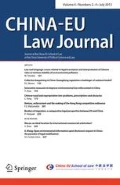Abstract
Chinese scholars often interpret the term “property” as set out in Art. 13 of the Constitution of China to bear the same meaning as property, as a right of private law. However, constitutional property is different from the form of property that exists as a statutory right. The interpretation of the constitutional concept shall not be replaced by just presenting the meaning of a statutory concept with the same wording. The sphere of constitutional property shall be determined only by constitutional interpretation. Drawing on American and German experiences, this article discusses whether ownership, inheritance rights and other rights of private law protecting economic interests, as well as rights of public law including right to education, public offices, vocational licenses and social security benefits are property in the context of the Chinese Constitution. The deciding factor is whether a specific right has economic value and thus expands the freedom citizens can actually enjoy, and whether the qualification of the right as property is compatible with relevant constitutional provisions. The author proposes a two-step approach to determine whether a specific right is constitutional property in China.
Similar content being viewed by others
Notes
Xue Xiaojian merely introduces relevant stipulations of Law on Assembly, Procession and Demonstration as illustration of freedom of assembly, of procession and of demonstration. See Jiao 2010, 393–394; Han Dayuan introduces the contents of Regulation concerning Religious Matters as the meaning of religious freedom. See Hu/Han 2007, 259–260. Similarly, some textbooks cite international law to elaborate basic rights of Chinese Constitution. For instance, Xiao Zhecheng refers to Art. 18 of International Convention on Civil and Political Rights to expound the meaning and limits of religious freedom in China. See Zhang 2008, 206–207.
Chen 2009, 4.
Wang 2004, 72.
Liang Huixing holds that it is a mistake to list property and right of inheritance in Art. 13 Sect. 2 CC as if there were parallel concepts. Liang 2004, 45.
Wang 2004, 72.
Gan 2010, 155.
419 U.S. 565 1975.
419 U. S. 565 1975, 573–574.
408 U. S. 593 1972.
BVerfGE 7, 377, 397f.; 39, 334, 369; 52, 303, 345; 73, 301, 315.
Brown, 5. St. Mary’s L. J. 299, 1973–1974.
397 US254 1970.
397 US254 1970, 264.
397 US254 1970, 262.
BVerfG, 1 BvL 1/09 vom 9.2.2010, Absatz 133 m.w.N.
BVerfGE 69, 272, 300; 100, 1, 32; 117, 272, 294.
References
397 US254 (1970)
408 U. S. 593 (1972)
419 U.S. 565 (1975)
BVerfGE
Brown JH (1973–1974) Comments, The Clouded Issue in Public Welfare: Rights v. Privileges, 5. St. Mary’s L. J. 299
陈斯喜 (Chen S) (2009) 序: 宪法的生命力在于实施 (Foreword: Implementation of the Constitution if of Vital Importance). In: 翟小波 (Zhai X) 论我国宪法的实施制度 (On implementation of the Chinese constitution), 北京: 中国法制出版社 (China Legal System Press, Beijing)
甘超英 (Gan C) (2010) 新中国宪法财产制度的历史回顾 (Historic retrospective on property system in New China). 中国法学 (China Legal Science)
胡锦光、韩大元 (Hu J/Han D) (2007) 中国宪法 (Chinese constitutional law), 北京: 法律出版社 (Law Press, Beijing)
焦洪昌 (Jiao H) (ed) (2010) 宪法学 (Constitutional law), 北京:北京大学出版社 (Beijing University Press, Beijing)
梁慧星 (Liang H) (2004) 对宪法修正案的若干私法解读 (Analysis of the Constitutional Amendments from Private Law Perspective). 现代法学 (Modern Law Science)
Reich CA (1965) Individual rights and social welfare: the emerging legal issues, 74 Yale L. J. 1245, 1255
Reich CA (1964) The New Property, 73 Yale L.J. 733
王兆国 (Wang Z) (2004) 关于《中华人民共和国宪法修正案(草案)》的说明 (Explanations about the Draft for the Constitutional Amendments). 中华人民共和国全国人民代表大会常务委员会公报 (Gazette of Standing Committee of National People’s Congress of PRC), 特刊 (special issue)
张千帆 (Zhang Q) (ed) (2008) 宪法学 (Constitutional Law), 北京: 法律出版社 (Law Press, Beijing)
Author information
Authors and Affiliations
Corresponding author
Rights and permissions
About this article
Cite this article
Xie, L. What is constitutional property in China?. China-EU Law J 4, 65–73 (2015). https://doi.org/10.1007/s12689-015-0054-3
Published:
Issue Date:
DOI: https://doi.org/10.1007/s12689-015-0054-3




